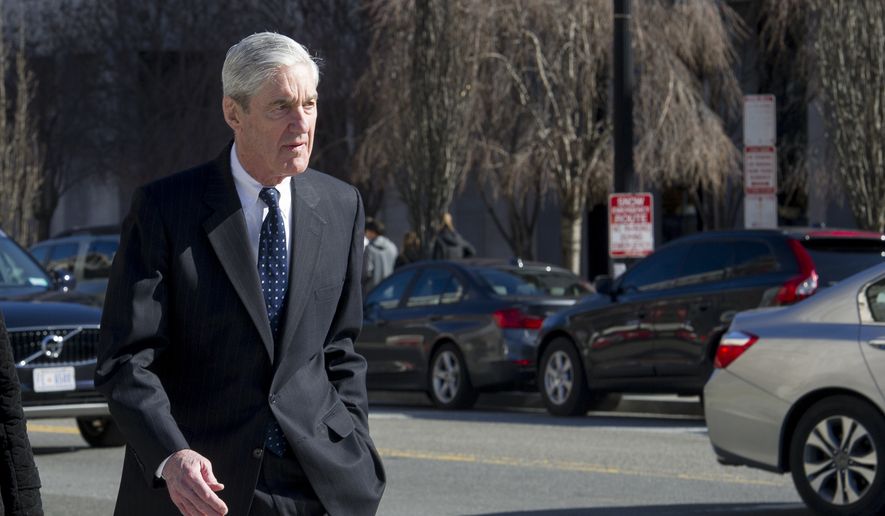Special counsel Robert Mueller found no evidence that anyone connected with President Trump or his 2016 campaign conspired with Russia to subvert the election, according to a summary of his findings released Sunday by Attorney General William P. Barr.
Yet Mr. Mueller did find actions by Mr. Trump after he was in office that could be seen as efforts to obstruct the investigation into the election. Mr. Mueller did not recommend prosecution, but he left the decision up to Mr. Barr, who said he doesn’t see enough evidence of a crime to pursue charges.
“Deputy Attorney General Rod Rosenstein and I have concluded that the evidence developed during the special counsel’s investigation is not sufficient to establish that the president committed an obstruction of justice offense,” Mr. Barr wrote in a letter summarizing his findings. The letter was sent to Congress on Sunday afternoon and quickly became public.
Mr. Barr said one main factor in his decision was that there was no evidence Mr. Trump or his team conspired to work with Russia to subvert the election. That meant it would be tough to find corrupt intent behind the president’s actions even though they might, in another context, have been obstruction.
“While this report does not conclude that the president committed a crime, it also does not exonerate him,” Mr. Mueller said in his report, according to Mr. Barr’s four-page summary.
But Mr. Trump, speaking to reporters in Florida, said the report was “a total exoneration.”
SEE ALSO: Muller report principal conclusions
“There was no collusion with Russia. There was no obstruction,” he said.
He said the past two years of investigations have damaged the country and said it was “a shame that your president has had to go through this.”
“This was an illegal takedown that failed, and hopefully, somebody is going to be looking at the other side,” he said.
Democrats, though, said Mr. Barr’s letter left them with more questions, and they seized on Mr. Mueller’s finding that the president did engage in troubling behavior toward the Russia investigation.
Rep. Jerrold Nadler, New York Democrat and chairman of the House Judiciary Committee, said he needs to hear more from Mr. Barr about his decision not to bring charges.
He said he was struck that Mr. Barr took just two days to review the results of the 22-month investigation and conclude that there was no prosecutable crime.
SEE ALSO: Donald Trump says Robert Mueller investigation is affront to Americans
“There must be full transparency in what special counsel Mueller uncovered to not exonerate the president from wrongdoing,” the congressman said. “DOJ owes the public more than just a brief synopsis and decision not to go any further in their work.”
Mr. Barr, in his letter, detailed the magnitude of Mr. Mueller’s investigation: 19 lawyers, 40 FBI agents, more than 2,800 subpoenas, 500 search warrants, nearly 50 wiretaps and 500 interviews.
The investigation has dogged Mr. Trump, his family and others in his orbit during the campaign, the presidential transition and his time in the White House.
Press reports and presidential critics, including top Obama administration officials, repeatedly claimed to have evidence of collusion between the Trump campaign and Russian operatives.
Mr. Mueller’s report punctures that narrative.
According to the Barr summary, Mr. Mueller found that Russians and Kremlin-affiliated individuals made multiple overtures to Trump campaign officials but that the campaign did not act on any of them.
Donald Trump Jr. and Mr. Trump’s son-in-law, Jared Kushner, were rumored to be targets of the investigation for their role in arranging a 2016 Trump Tower meeting with a Russian lawyer who promised to provide dirt on Mr. Trump’s campaign rival, Democrat Hillary Clinton.
Mr. Barr’s letter does not detail the specific findings of that situation but was unequivocal in its conclusion.
“The special counsel did not find that the Trump campaign, or anyone associated with it, conspired or coordinated with the Russian government in these efforts, despite multiple offers from Russian-affiliated individuals to assist the Trump campaign,” Mr. Barr wrote.
Although Mr. Mueller brought dozens of charges against some in the Trump orbit over the past 22 months, all stemmed from concealing information and financial crimes of their own making rather than conspiracy to subvert the presidential election.
Congressional Democrats said the Barr letter is just the beginning.
They demanded that Mr. Mueller’s full report be made public. Democrats also have told Mr. Mueller to preserve all of his work, signaling that Congress will want to see his raw materials and perhaps pursue its own investigations.
They have already publicly discussed subpoenaing Mr. Mueller to testify before Congress, and Mr. Nadler said he will soon order Mr. Barr to appear to talk about his own decision-making.
It is not clear when the report will be made public.
Mr. Barr’s letter said his intent is to release as much of the special counsel’s report as possible, but he added that Justice Department regulations prohibit the release of damaging information about people not charged with a crime.
Mr. Mueller’s investigation led to indictments, convictions or guilty pleas for 34 people and three companies. Among them were the president’s former campaign chairman Paul Manafort, onetime National Security Adviser Michael Flynn and Mr. Trump’s former attorney Michael Cohen.
The Cohen case was brought by federal prosecutors in New York based on information that Mr. Mueller turned over to them. Cohen says Mr. Trump is implicated in campaign finance malfeasance, though no charges have been brought against the president.
Although none of the Trump associates was charged with conspiracy to subvert the election, Mr. Mueller did uncover evidence of Russian interference.
He filed charges that accused 25 Russians of hacking email accounts of members of Mrs. Clinton’s campaign or organizing a social media campaign to spread lies and misinformation about the candidates on the internet.
• Stephen Dinan can be reached at sdinan@washingtontimes.com.
• Jeff Mordock can be reached at jmordock@washingtontimes.com.




Please read our comment policy before commenting.